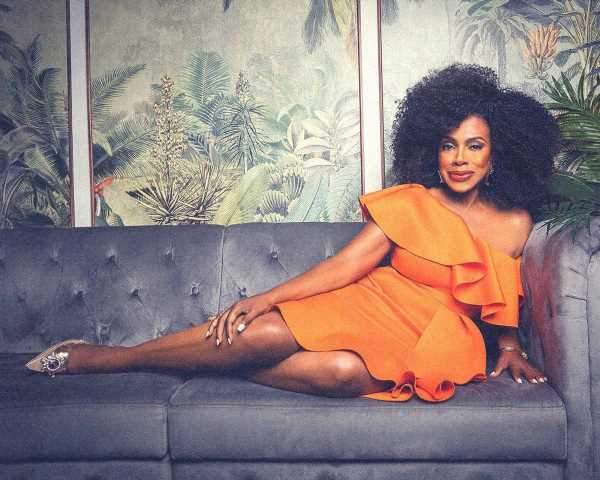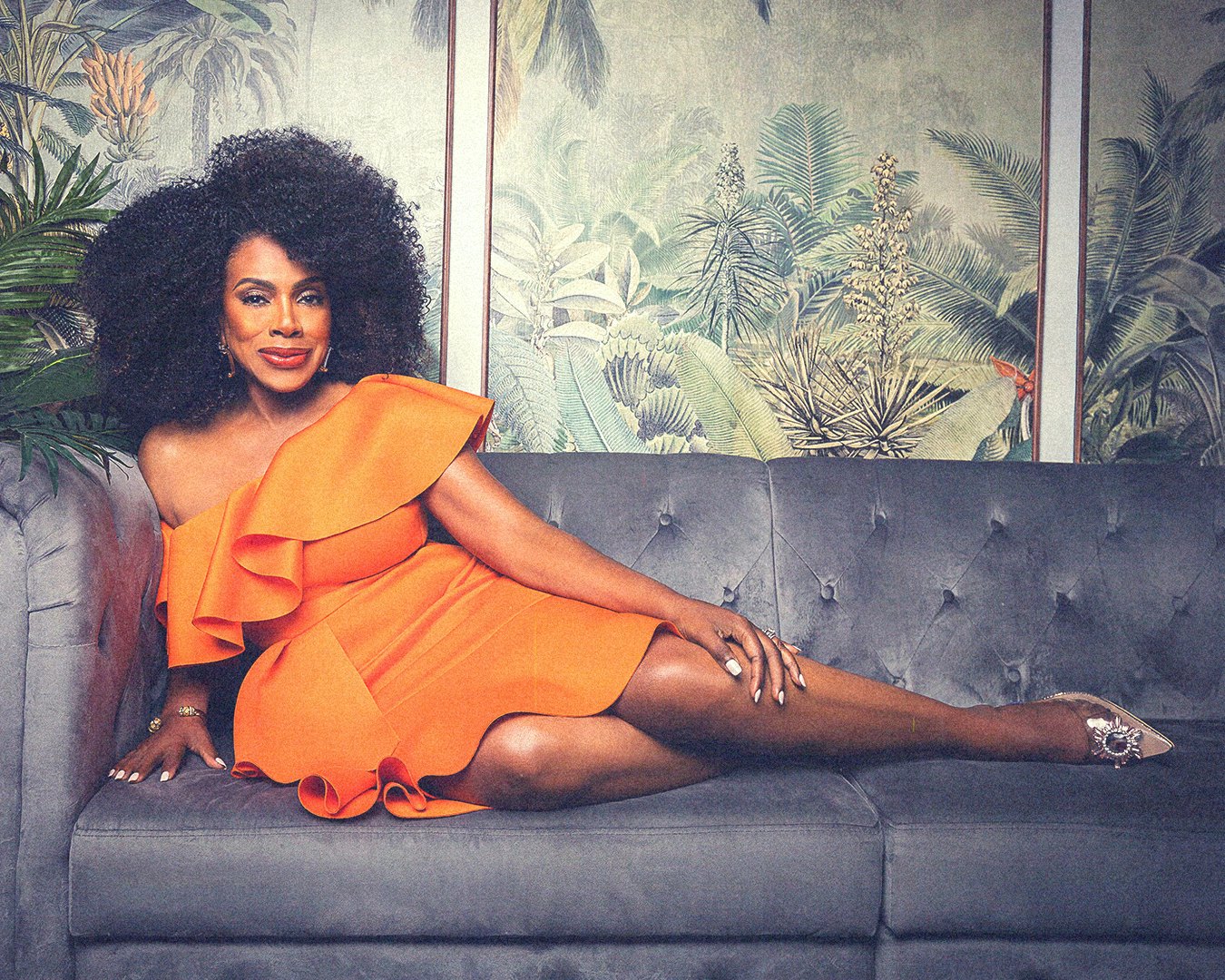Abbott Elementary’s queen bee and our forever Dreamgirl shares the power of pouring into yourself and prioritizing your well-being.
Sheryl Lee Ralph has great energy; the kind that wraps around you in a warm embrace just seconds after falling into conversation. Throughout her 45-year career, the multi-hyphenate has endeared audiences with a number of memorable roles: She first dazzled as Deena in the original Broadway production of Dreamgirls, the same part that eventually went to Beyoncé in the 2006 film adaption. Many millennials got to know her as Dee, the sensible matriarch and principal on the hit 90s sitcom Moesha, and as Lauryn Hill’s tough-as-nails mother in Sister Act 2. Now, Ralph brings her talents to Abbott Elementary—the mockumentary-style sitcom helmed by comedian Quinta Brunson—as Barbara Howard, a dedicated elementary teacher working among a mixed bag of personalities at an under-resourced Philadelphia school.
“I feel so majorly blessed,” Ralph reveals over the phone, pausing to take in the iconic roles that have connected her with viewers across generations. “As a performer, if you had one great thing in your career that would be enough.” Her schedule remains stacked—from running her annual HIV/AIDS awareness benefit Divas Simply Singing to serving as Vice President of the Los Angeles SAG-AFTRA chapter to producing the Broadway play Thoughts of a Colored Man, which runs directly across the street from where she first got her start on Broadway. How does one balance so much, especially amid a global pandemic?
“I think it’s by realizing that you do not have to do it alone,” the actor-singer-producer says, emphasizing the importance of community and the abundance that can spring from being open to receiving help. “If you surround yourself with the right people to help you build up your foundation, it can be done. It’s when we think we need to do it all by ourselves, that’s when it gets off balance, off-track.”
Ralph also credits her career endurance to her “strong Jamaican mother,” who spoke life into her from the time she was a child. The regular stream of affirmations, the celebration of her natural and cultivated gifts, and the love that surrounded her steadied Ralph into the deep knowing that she is deserving—of comfortably taking up space, of respect and nourishing love, and of experiences and connections that align with her peace and happiness. This particular lesson of self-love has served as a life vest of sorts, especially when navigating the unhealthy amounts of rejection and scrutiny that have long accompanied working in the entertainment industry.
Here, Ralph reflects on embracing a celebration of self as a regular practice and why she’s thrilled for this next chapter.
Abbott Elementary is such a delightful watch. I love how comedy is used to explore the systemic inequities and intentional neglect of low-income neighborhoods. Did you know as soon as you read the script that you wanted to be a part of the show?
I knew before that I wanted to be a part of the show because of Quinta Brunson. I met Quinta on a series called A Black Lady Sketch Show and it just seemed to me like she was studying me, and I was like, “Oh, this is wonderful. This young artist thinks I’m something special.” She called me and asked me about her new project, saying, “Ms. Ralph, I know you’re at a stage in your career where you should be offered things, but would you mind just meeting the people and blah, blah, blah because this is for you.”
Once I read the script, I really loved the character of the principal. And I said, “Give me a shot at the principal." She was like, “No, absolutely not. You are Mrs. Howard. We need a queen and you are her.” She may be tiny, but she is truly mighty as our creator. Quinta Brunson—that’s a name to remember.
In episode two, there’s a great scene that touches on the importance of not taking on every issue to the point where you experience burnout. In your own life, how have you used self-care to avoid burnout?
It is the notion that I’m very comfortable doing nothing. I take my sleep seriously. I try to improve the amount of water that I drink or don’t drink because water is the most amazing elixir of life that we don’t partake of enough. The fact that I get to look at my children and just love them and appreciate the smaller things in life. Because if you pay attention, you’ll realize how very large and important those things really are.
That makes me so happy to hear, especially just processing a Black person saying, “Rest is a priority for me.”
I give myself permission to be well-rested. That’s how I operate. I give myself permission to be great. I give myself permission to be wonderful. I give myself permission to be fabulous. I am not looking to anybody else to make me feel as good as I need to feel to carry on in this life. I’m going to do what I have to do for me. That’s it. I am not your Superwoman. I am my own Superwoman. And I know when I need to take my cape in to be dry-cleaned.
Loving yourself well also connects to setting boundaries, which aren’t always well-received or respected by everyone. Does setting boundaries in your own life ever get uncomfortable or feel difficult?
It used to be, but now I’ve learned the power of no. I’ve learned the power of, “I would love to, but I just can’t.” I’ve also learned through rejection. Being a child of the ’60s, being Black in the ’60s, being bullied in the ’60s. I mean, there is very little understanding of what it was like to be a Black, upwardly mobile child in the ’60s, knowing that there was a place for you in the world even if you were going to have to make it for yourself. The names that you were called, the way that you were treated, the way people wanted to tell you, “Don’t even bother to try, because it’s not for you,”—how that was going on every day, and how you looked for that bright spark.
I’m so happy that I was an immigrant’s child in some way, because that immigrant experienced something different. [My mother] told me that I was beautiful, she told me that I was smart. She really empowered me. [She and my dad] were a perfect combination for me. It just made things work out well for me because I was not the cutest little girl. My nickname used to be “ugmo” and they’d make fun of my lips all the time. They used to call me “liver lips.” And now girls are paying upwards of $5,000 for lips like mine, and mine still look better. Sometimes I think about what I’ve carried with me, and I’ve been able to leverage my pain into my purpose in life: to carry on to the best of my ability, knowing that I am worthy.
In an industry that still insists on limiting people to certain boxes due to age, race, body type, and so on—how do you stay creatively nourished?
This industry has shown me if you keep waiting for people to tell you, “You’re good. You’re okay. You’re talented,” you could be waiting a very long time. That’s why you have to start to write your own stories, do your own movies, write your own songs, create your own magic.
I’m good. I like myself. I love what I do. I’ve made great relationships. I’ve been able to hold on to relationships. I have lived a life. I have a husband who loves and adores me. I’ve raised two children who are adding more to the world. And I’m happy. I love me. I look in the mirror every morning, and I say, “You better go, girl, because you are winning every time. Yes, you are. Yes, you are.”
Yes!
People can be very much the dream killers, but you can’t let them kill your dream. I remember coming to Hollywood right after Dreamgirls and the big Hollywood casting director looked at me and said, “Well, everybody knows you’re a beautiful, talented Black girl, but what do I, meaning Hollywood, do with a beautiful, talented, Black girl? Do I cast you in a movie with Tom Cruise? Does he kiss you? Well, who goes to see that movie?”
I walked out of that meeting thinking, “Wow. Everybody knows that I’m a beautiful, talented Black girl. Everybody knows that I deserve to be cast in a movie with the likes of Tom Cruise, and he should kiss me, and people need to see it.” And he was trying to kill my dream, but I couldn’t let him kill my dream. I had to turn it around and encourage myself, empower myself to carry on.
You mentioned your mother earlier and the significance of Jamaican culture in your life from day one. Is going back home to Jamaica another part of your self-care?
Absolutely. I am so thankful for the blessing in my life called Jamaica and my ability to go back whenever I want just to be refreshed, just to be inspired, just to be there. My mother used to say, “There’s nothing wrong with talking to yourself as long as you don’t chat foolishness in your ears.” So, I’ve always been able to encourage and empower myself, respect myself, and try and build myself back up in bad times. We are set up for so many no’s before we get to the one great yes. I’ve been too tall, too short, too Black, and not Black enough all in one day, but I was never going to let it deter me from my dream. Never.
Are there other wellness experiences you’ve felt connected to lately?
I really am inspired by [my family], Etienne [Maurice], Coco [Ivy-Coco Maurice], and Marley [Ralph], for creating WalkGood. In Jamaica, we say, “Walk good,” meaning have a safe journey from here to there or wherever it is you’re going. Walk good. And in response to the murder of Ahmaud Arbery, Etienne created yoga for young people of color to express themselves and heal. I love the idea of taking quiet time to be with oneself, to respect your body, and to heal yourself. So, I love the whole idea of WalkGood.
I’m also working on developing a product from my Uncle Simeon. When I was younger, Uncle Simeon used to have all these bottles and concoctions. In the latter part of his life, I was like, "Uncle Simeon, what is all of this?" And he shared some of it with me, so now is the time to be able to make them live their life and do their healing. I think part of it is finding those great products that continue to heal the body from the inside out. And you know, making sure that the Black does not crack, that we keep maintaining the fabulosity.
Source: Read Full Article

